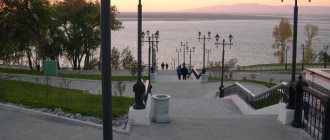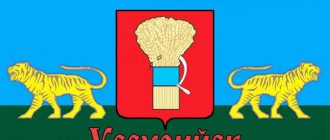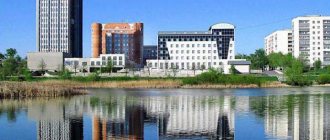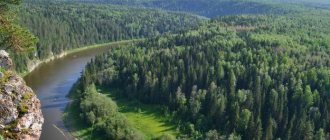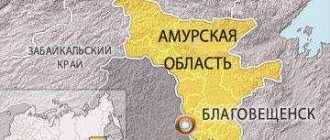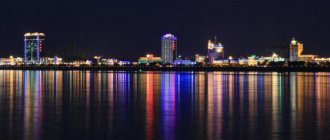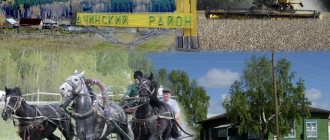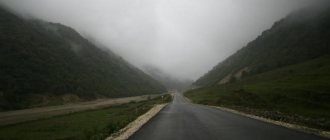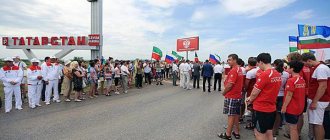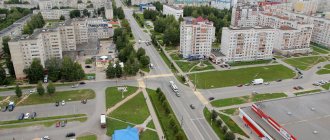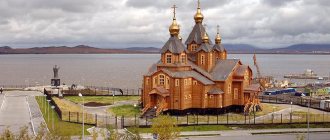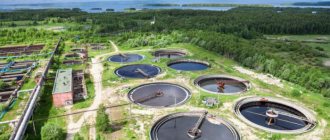In the Far East of the Russian Federation is the city of Khabarovsk. It is the administrative center of the Khabarovsk Territory and the Far Eastern Federal District of the Russian Federation. In the East it occupies a leading position in education, culture and politics. It is a large industrial and economic metropolis. It is located at a distance of about 30 km from the border of the People's Republic of China.
Where exactly is Khabarovsk? What is the city's climate? What is the area of Khabarovsk? Also below are data on the population of the regional capital. It also talks about the economy and describes the regions of Khabarovsk.
General information about the city
Initially, Khabarovsk was located on neutral territory, without borders, between the Russian Federation and China. And only after a general agreement was the disputed land given to the Russian Empire. Khabarovsk was founded in 1858, and in 1880 it was given city status. Since 2002, it has become part of the Far Eastern Federal District.
The city became the capital of the Khabarovsk Territory. It houses the headquarters of the military district, 200 regional federal authorities, as well as the Ministry for the Development of the Far East. He is a member of the Association of Siberian and Far Eastern Cities.
In the center, where Khabarovsk is located, the largest air and railway transport routes intersect. The city is located on the outskirts of the state and in a different time zone. That is why the question arises: “How long is it from Moscow to Khabarovsk?” It is located at a distance of 8 thousand 500 km from the capital of the Russian Federation, if you travel by rail, and about 6 thousand km by plane. Today the transport interchange is well developed. The city has two airports, four railway stations, and a river port.
Medicine
There are 36 municipal healthcare institutions in the city:
- clinics;
- hospitals;
- maternity;
- diagnostic center;
- ambulance station;
- emergency service;
- children's home;
- sanatoriums.
In addition, a network of medical institutions has been developed to provide high-tech assistance to the population. There are family clinics and traditional Chinese medicine centers.
Medical care for Khabarovsk residents is provided at a high level, so the birth rate in the city is increasing and natural population decline is decreasing.
As you can see, the quality of life in the Far Eastern capital is at the proper level. In the city on the banks of the Amur there are many places for good rest, study and work. Housing is expensive, but recently a number of government programs have been implemented here, and real estate prices are gradually beginning to recover.
Climate and time zone of Khabarovsk
What is the climate in the city? Where is Khabarovsk? The city is located in the southern Middle Amur Lowland, where two rivers merge: the Ussuri and the Amur. It is washed by the Seas of Japan and Okhotsk. Its relief is varied. The central part is located on gentle hills (hills) above sea level 70-90 m.
Due to its close location to the sea, the climate of Khabarovsk is moderate, with warm but rainy summers and cold winters. In winter, the average temperature is around -20 degrees, and the temperature in mid-July is about +21 degrees. The climate of Khabarovsk is monsoon type, as in winter there is little snow and cold, and in summer it is warm and often rains. In January 2011, weather forecasters recorded the lowest temperature of -41 degrees. In the summer of 2010, the thermometer showed a maximum temperature of +36.7 degrees.
The time zone of Khabarovsk is located in Vladivostok time and is offset by +10 hours Coordinated Universal Time (UTC). The difference with the Russian capital is +7 hours.
Population and area of Khabarovsk
Khabarovsk Territory is the most sparsely populated region of the Russian Federation. This is mainly influenced by the harsh climate, as well as the decline of the economy, which has continued since post-Soviet times. As of 2021, the population in the region is 1 million 333 thousand 294 people, where the population density is 1.69 people per km².
Despite the difficulties, the population of Khabarovsk increased every year. In 2003, the number of residents was 580 thousand 400 people, and according to analytical estimates in 2021, 616 thousand 242 people live in the regional capital. The city ranks second in population among the cities of the Far East.
The population of Khabarovsk and the Khabarovsk Territory is multinational and diverse. As of 2010, the percentage of residents of different nationalities is:
- about 92% are Russian;
- 2.1% - Ukrainians;
- 0.8% - Nanais;
- 0.6% - Koreans, Tatars;
- 0.4% - Belarusians, Evenks;
- 0.3% are Chinese.
The main part (about 65%) of Far Eastern residents are workers and students. Many residents have higher education. Children and teenagers make up 19% of the total population, and pensioners make up 16%.
The administration of the city of Khabarovsk is trying with all its might to improve conditions for large families in the city: medical care is becoming better, providing financial assistance, improving the health of children of low-income families, building playgrounds, landscaping parks, etc.
The area of Khabarovsk is 386 km². The length of the city along the coast is 33 km.
Educational establishments
In the regional center there are hundreds of secondary schools, colleges, schools, and universities.
More than 40 educational institutions train specialists with primary and secondary vocational education. The higher school is represented by three dozen universities and institutes, and a developed branch network.
Prestigious universities include:
- Far Eastern Medical University;
- Pacific State University;
- Amur Humanitarian and Pedagogical University;
- Khabarovsk Border Institute of the FSB of Russia;
- Far Eastern Institute of Foreign Languages;
- Far Eastern Institute of International Relations.
Mayor of the city
The mayor of Khabarovsk since September 2000 is Alexander Nikolaevich Sokolov. Was selected for 4 years. In 1981, he was appointed head of the industrial and transport department of the Zheleznodorozhny district party committee. In 1983 he became secretary of the party committee of the plant. Gorky, and in 1986 he was appointed director.
In Khabarovsk in 1990, the first democratic elections of the city Council of People's Deputies took place. A. N. Sokolov was elected to the post of deputy and chairman of the city council. His ability to rally strong people around him and his great efficiency helped him win the elections. Already in 1993, he was appointed deputy head of the administration for economic issues.
During the second elections in 2004, A. N. Sokolov took the leading place and received 83.84% of the votes. The mayor of Khabarovsk was also elected for a third and fourth term of office and remains in this position to this day.
Cost of products
The table shows prices in Khabarovsk for basic food products at the beginning of 2021.
| The product's name | Volume | Average price in rubles |
| Cottage cheese | 0.5 kg | 160 |
| Rice | 1.0 kg | 100 |
| Kefir | 1.0 l | 75 |
| Milk | 1.0 l | 85 |
| Potatoes, cabbage | 1.0 kg | 35 |
| Sugar | 1.0 kg | 47 |
| Beef | 1.0 kg | 300 |
| Sausages | 1.0 kg | 215 |
| Salad (greens) | 0.5 kg | 200 |
| Bread | 1.0 kg | 36 |
| Vegetable oil | 1.0 l | 75 |
| Eggs | 10 pieces. | 70 |
| Fish | 1.0 kg | 300 |
| Beef | 1.0 kg | 250 |
| Sugar | 1.0 kg | 60 |
| Chickens | 1.0 kg | 200 |
| Pasta | 1.0 kg | 80 |
| Mushrooms | 1.0 kg | 200 |
Administrative division into districts
The city is divided into 4 districts: Central, Northern, Railway and Southern.
The districts are divided into Khabarovsk districts. There are 5 administrative districts in the city:
- Central is one of the old administrative districts, the center of Khabarovsk. Its territory area is 9.5 km². It differs from others in its more developed infrastructure, cleanliness and amenities. The transport system is well developed. There are educational, cultural and shopping centers here. The river station and the central market are located. As of 2021, the number of residents in the area is 96 thousand 155 people.
- Krasnoflotsky is a district with a population of 91 thousand 997 inhabitants.
- As of 2021, 53 thousand 674 citizens live in the Kirovsky district.
- 151 thousand 990 people live in the Zheleznodorozhny district. It is one of the large areas in the eastern part of the city. It was created in 1938 by order of the Supreme Council of the RSFSR. Its territory occupies about 9.6 thousand hectares. There is an airport, a railway station, a military airfield and a bus station here.
- The industrial district is the largest. 222 thousand 426 people live in it. Located in the southern part. The area has two main transport roads that cross the city from north to south.
Marriages/divorces
The parameter has a significant impact on the demographic situation. The number of marriages affects the birth rate and the natural increase in the number of inhabitants. It is important to know how many marriages have been concluded/divorced.
The current number of marriages and divorces does not show an accurate picture, since the processes of registration/dissolution of family unions have been suspended due to the coronavirus pandemic. March 2021 – 560 marriages were dissolved, April – 192. April 2021 – the divorce rate was 588 registered cases. The number of registered marriages in 2021 exceeds the number of broken ones. According to official data, in April of this year - 588 couples legalized their relationships.
Industrial enterprises and economics
The factories of Khabarovsk make up the bulk of the industrial city. There are 86 main industry enterprises. Main activities:
- processing production;
- distribution and production of water, electricity and gas;
- communications and transport;
- mechanical engineering;
- metal processing;
- wood processing and fuel industry;
- construction;
- provision of catering services and trade;
- Developed activities in the real estate sector.
Since the city needs the development of modern infrastructure and the construction of housing complexes, the city has a mechanism for attracting investment on a long-term basis. In 2008, about 46 million rubles of investment were attracted for construction.
There are about 28 municipal enterprises operating here, operating in 7 sectors of the economy. They constitute the economic sector of the administrative center. The amount of their assets is equal to 13.1 billion rubles.
The Khabarovsk city administration has developed a strategic development plan until 2021. 60 targeted programs have been prepared, most of which are aimed at economic and social development. To implement it you need:
- creating good, safe conditions for citizens;
- creation of a scientific and technical center in the region;
- formation of trade and transport logistics in the region;
- improving the work of the administrative and political center of the Russian Federation in the Far East.
Migration
There is a significant migration outflow. Beginning of 2021 - the Khabarovskstat department announced a record for the decline in the number of citizens: in 2021, 7 thousand residents left the settlement. Most of the arriving foreigners are residents of the countries of the Commonwealth of Independent States.
The reasons for the migration outflow are poverty, unemployment, social insecurity, and an unstable political situation.
Railway transport
Railway construction is actively developing in the Far East. The history of the city station begins with the reign of the great Romanovs. According to historical data, it was they who laid the first stone where the largest railway routes now pass, carrying huge cargo and a large number of passengers.
In 1891, the Ussuri Railway was built, and already in 1897 a road was built between Khabarovsk and Vladivostok. The construction of the Amur section of the Trans-Siberian Railway turned the city into a major transport hub. This is how the Khabarovsk-2 railway station appeared. Subsequently, a large Zheleznodorozhny district was built.
Khabarovsk-1 Railway Station is a passenger railway station that impresses all visitors with its original architecture. It was opened in 1905. The station is located in the center of the city itself. In its one hundred and tenth year, the station was completely renovated using funds from the city budget, with the participation of local patrons. From the former station, only the famous monument to E.P. Khabarov, which stands on the station square, remained untouched.
A brief excursion into history
The city was founded in 1858, after the conclusion of the Aigun Treaty on the division of territory with China. At first it served as a military post and was named Khabarovka, in honor of the Russian traveler and explorer Erofei Khabarov. By the end of the 19th century, the village, whose population at that time barely reached 15 thousand people, received city status and was given its current name. Subsequently, following the program of economic development and settlement of the Far East, the settlement began to develop rapidly, which was greatly facilitated by the construction of the Trans-Siberian Railway, including a massive bridge across the Amur River, which appeared in 1916. The Soviet era was marked for Khabarovsk by the construction of new residential areas, the emergence of dozens of plants, factories and production workshops. A significant breakthrough has occurred in the development of culture and education. After the collapse of the USSR, the city took a lot of time to restore the economy and stabilize trade relations with Asian countries. Now, Khabarovsk, along with Vladivostok and other large centers of the Far East, occupies a high place in the political and economic structure of the country, being, moreover, a strategically important transport hub connecting several regions.
City transport
Khabarovsk is of great international and regional importance in transport communications from the north to the west of the country. The city connects the federal points of the Ussuri, Amur, Khabarovsk-Komsomolsk-on-Amur and Vostok highways. Back in 1893, a bus station was built that could support a passenger flow of five hundred passengers per hour. International buses connect the central and eastern regions.
With the help of the Amur River Shipping Company, passenger and cargo transportation is carried out along the Amur River. The vessels carry out sea transportation (both cargo and passengers) to remote areas of the Far Eastern Territory. The city has a cargo river port, a river station for passengers, and a Khabarovsk fleet repair and maintenance base. Passengers travel down the river using the Meteora motor ships, and up the Tunguska River there is a series of high-speed ships called Zarya. In Soviet times, cruise ships sailed along the Amur River. Currently, such ships have already been canceled, however, it is quite possible that cruise routes will return in the future.
Air transport in Khabarovsk is well developed. Air transportation is carried out through the Small and Large airports, which are located ten kilometers from the center of Khabarovsk. In addition, the city has an aircraft repair base. Air traffic from Japan to Europe passes through the air traffic control zone. The Central and Dynamo military airfields are located here.
Trams, trolleybuses, minibuses and buses run around the city. The length of intracity transport lines is about 500 kilometers. Due to the complex networks of underground rivers and mountainous terrain, no metro was built in the city. Such construction would threaten Khabarovsk, which, with any flaw, could go underground.
Amur river
In addition to the bridge itself, you can admire the beauty of the Amur River , which ranks 4th among Russian rivers and tenth among world rivers.
View of the Amur, the Khekhtsir ridge can be seen in the distance
The river got its name “Amur” from the word “amar” or “damur” common to the Tungus-Manchu languages, which means “big river”. But the Chinese interpretation (the river flows on the border of Russia and China ) of the name is much more interesting. Initially, the Chinese nicknamed the river “ Heihe ” - black river, then “ Heilongjiang ” - “ Black Dragon River ”.
The last name is associated with a legend according to which in ancient times two dragons lived in the river - black and white. The latter personified evil - he sank boats, took fishermen to the bottom, and generally caused mischief in a million different ways. This continued until he was curbed by the Black Dragon , a symbol of kindness. Since then, the Black Dragon settled on the border of the Amur and Jewish Autonomous Regions , and the Amur was nicknamed the Black Dragon River .
View of the Amur from the park above the embankment
The length of the Amur is more than 4.5 thousand kilometers, and the area of its basin is 1.8 million square kilometers.
Art and culture of the city
Khabarovsk is not only a large industrial center, but also a city of culture in the Far East. It houses the following city museums:
- Regional Museum. It was founded back in 1894 with the help of the Amur Department of the Russian Geographical Society. A stone turtle weighing 6,400 kg was installed in front of the building. In 2005, the museum opened a new exhibition of Amur fish.
- Museum of Archeology named after. A. P. Okladnikova.
- Museum of the History of the City. It was opened in 2004. It contains museum exhibits from Khabarovsk from the pre-revolutionary period to modern times.
- Art Museum.
- Military History Museum of the Far Eastern District. Started working in 1983. It contains samples of military equipment from different times.
- Amur Bridge Museum.
- Art Gallery named after. Fedotova.
- Museum of the history of Khabarovsk-1 station.
Since 1978, the central library named after. P. Komarova, as well as its ten branches. A children's library was also built. A. Gaidar and the scientific library of the Academy of Science and Law.
Peculiarities
Located in close proximity to the Russian-Chinese border, Khabarovsk is important in trade relations between these countries and has business ties with other nearby Asian countries, including Japan and South Korea. The city is home to many factories and industries, official representative offices of large commercial organizations, educational and cultural institutions. The infrastructure here is well developed, transport links are well established, there are dozens of comfortable hotels, functional shopping and entertainment complexes, high-tech facilities, supermarkets, restaurants, and nightclubs. The cultural program includes visits to numerous attractions, museums, exhibitions and art galleries. Sports occupy a special place in the lives of city residents, which is not surprising, given the presence of successful and reputable professional clubs representing such leading disciplines in the country as hockey and football. For walks, within the city limits, there are picturesque parks and squares that harmoniously fit into the architectural appearance of the capital of the region.
Monuments and squares
There are a lot of squares and monuments in the city. The main square of Khabarovsk is Lenin. It hosts all the city's parades and celebrates outstanding local holidays. She is recognized as the most beautiful in the city. The central square of Khabarovsk is Slava Square. It was opened in 1975. There is a monument to the heroes of the Great Patriotic War on it. Komsomolskaya Square is the oldest in the city. In 1923 it was renamed Red Square.
In 2012, the city was awarded the honorary title of the Russian Federation “City of Military Glory”. Stella was erected in honor of this title. Its opening took place in 2015, that is, on the seventieth anniversary of the end of the Second World War. At the foot of the monument, the city administration plans to open a city museum dedicated to the same topic in the near future.
At the Lenin Stadium, the “Black Tulip” monument was erected in honor of the soldiers who died in the Afghan War. The author of the monument was the famous sculptor Yu. Kukuev. The “Black Tulip” attracts a lot of attention from tourists, although what can I say - local residents involuntarily look back at the monument when accidentally passing by. Many townspeople visit him to honor the memory of their relatives or friends.
Near the stadium there is a monument to the Young Defenders of the City. The monument was built in 2004 in honor of those killed during the 1921 Civil War.
A monument to Captain Y. Dyachenko was erected on a granite platform. It was built solely with donations from townspeople. Next to the monument there is a street named after this man.
Travel tips
You can visit Khabarovsk at any time of the year, but it is especially interesting here during the New Year holidays. An elegant and original city will not let you get bored and will give you a lot of positive emotions. If tourists are fans of life in the dark, then the night clubs “Sky” and “Hospital” are waiting for them.
You can have a snack either at the hotel establishment, or visit one of the many city cafes. The “Gallery” and “Chocolate” establishments are especially popular among local residents. By the way, in the city you can taste not only Russian cuisine; the proximity of China has left its mark on the city. If tourists want to taste Asian dishes, then they should stop by the Beijing restaurant. Here travelers can enjoy duck cooked according to the famous recipe, pork in sweet and sour sauce and very tasty beef.
Famous Landmarks
More than a hundred years ago, the Amur Bridge was built - this engineering miracle is the largest bridge in all of Russia. There is rail and two-way road traffic here. Connects the banks of the Amur River. This is one of the unique places in the city.
Modern Khabarovsk has many beautiful places that both tourists and city residents love to visit. In 1983, amazingly beautiful city ponds were built. They consist of three ponds, which are created in the form of a cascade and are separated by a small dam. Around them lie green and shady alleys. In 2011, light illumination and fountain equipment were installed on the ponds. Nowadays, many citizens gather here in the evenings to enjoy the light show, and during the day, those who enjoy the pleasant murmur of the fountains stroll nearby.
Also the city embankment named after. Nevelskogo is a tourist attraction. The Amur cliff is the pride of the townspeople themselves. Local residents often come to this beautiful place to relax with their families, lovers make appointments here, and older townspeople like to stroll. The Amur cliff is considered a particularly romantic place for lovers and newlyweds; during the “wedding season” newlyweds are photographed here every now and then, and people believe that visiting this place on their wedding day is a sign of strong family happiness. The Amur cliff is located in the historical part of Khabarovsk.
On Komsomolskaya Square there is another pride of the Far East - the Grado-Khabarovsk Cathedral of the Assumption of the Mother of God. Every traveler visits it to look at the extraordinary beauty of the cathedral's architecture. The height of the temple is 50 m. It is the first one that is clearly visible immediately upon entering the city. The building took ten years to build, and in 1886 the first service was held there.
Muravyov-Amursky Street is another famous landmark of the city, both among locals and tourists not only in Russia, but also from other countries. It is here that those very old houses have been preserved, which stand out sharply against the background of the modern city, reminiscent of the past. On the street there are many cozy restaurants and cafes that offer both coffee and cakes and full meals at affordable prices, and there is also the best cinema in the city. The shops sell Far Eastern souvenirs for tourists.
Admiral Nevelskoy Embankment
appreciate all the beauty and power of the Amur from the city embankment. She received her name in honor of the great Russian admiral and explorer of the Far Eastern lands - Gennady Ivanovich Nevelsky .
Embankment from the cliff
Initially, the embankment had a length of a modest two kilometers, but work is currently underway to extend it. After construction is completed, the embankment will run almost along the entire city. Over the past few years, the water level in the Amur has reached critical levels, which complicates construction.
Amur embankment from the cliff
Over the past few years, the embankment itself has become very comfortable for walking - there are benches with awnings along its entire length, pedestrian and bicycle paths have been installed, the slopes are covered with grass and bushes, and a router with Wi-Fi has been installed. Part of the embankment is occupied by an amusement park; in winter there is an ice skating rink.
